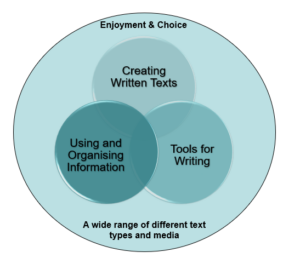Within a curriculum that promotes enjoyment and choice through exploring a wide range of different types of text and media, learners have opportunities to develop effective skills for writing.
Learners will have opportunities each year to create texts for the three main purposes of writing: to persuade, to inform, and to entertain. Through varied writing experiences, learners will increasingly develop their knowledge, understanding and skills as appropriate to the text types aligned with these purposes. They should develop increasing levels of enjoyment, confidence and competence when exploring and experimenting with different styles of writing, as well as the tools which enhance the communication of ideas and information.
The integration of the CfE Writing organisers within a responsive and inclusive curriculum helps learners develop as confident, effective communicators. By thoughtfully planning the writing process and providing targeted support where needed, practitioners can reduce cognitive overload and create the conditions for writing to be a meaningful, enjoyable and successful experience for all.
Assessment and Analysis
The Writing Assessment Resource Pack has been developed to support practitioners in planning, delivering, and moderating high-quality learning, teaching, and assessment of writing. It offers a range of practical tools and guidance to promote a balanced and progressive approach to writing across all levels.
Core Resources
These materials are intended to be used flexibly but provide greater consistency across all schools and settings in Fife.
Contextualised Curriculum
As writing skills are central to many aspects of learning, a well-established writing culture will encourage and support the creation of text for different purposes across a variety of contexts. Through daily routines, activities, and experiences across the curriculum, practitioners will harness opportunities for learners to communicate their ideas or other information in the written form whether this is following their own learner-initiated or teacher-directed purposes.
Practitioners will provide authentic, meaningful contexts for writing, linking academic learning to aspects of life and the broader world. Supporting learners to see the purpose for their writing, as to persuade, inform or entertain, rather than simply completing a task, is central to building motivation and confidence and help them value writing.
Responsive Routes
Writing is best viewed as a process, and when carefully scaffolded into manageable stages, learners are more likely to approach extended writing with greater confidence and enthusiasm. To ensure learners experience success, practitioners will plan a writing process that builds essential knowledge, skills and understanding throughout each stage, responsive to the needs of learners.
Inspiring Input
A well-chosen stimulus or engaging ‘hook’ can captivate interest, generate curiosity, and spark imagination. Practitioners will be discerning and creative in their use of stimulus, selecting evocative and engaging content that provides an effective starting point from which further learning can flourish.
Intentional Instruction
In high-quality writing pedagogy, teachers deliberately plan, model, and scaffold the writing process to ensure that learners build essential skills and understand the purpose behind what they’re being asked to do. Practitioners will write in front of learners, demonstrating the process of creating text and make their thought processes visible and audible, helping learners understand the decisions writers continually make to enhance communication. Through a scaffolded approach, practitioners will gradually release responsibility supporting learners to apply writing strategies and techniques with increasing independence.
The Gradual Release of Responsibility (Writing) outlines the process in practice.
Optimising Opportunities
Practitioners will effectively plan daily opportunities to develop greater confidence and skill in creating written texts. This will be achieved most effectively through an appropriate balance of teacher-led, teacher-directed and learner-led activities.
Professional Learning
A range of professional learning modules are available to help practitioners to continue building their knowledge and practice of our Core Approach in Fife — at their own pace, and in the areas most relevant to them or their school improvement priorities. These can be accessed in the Literacy Core Approach PL Materials section.

